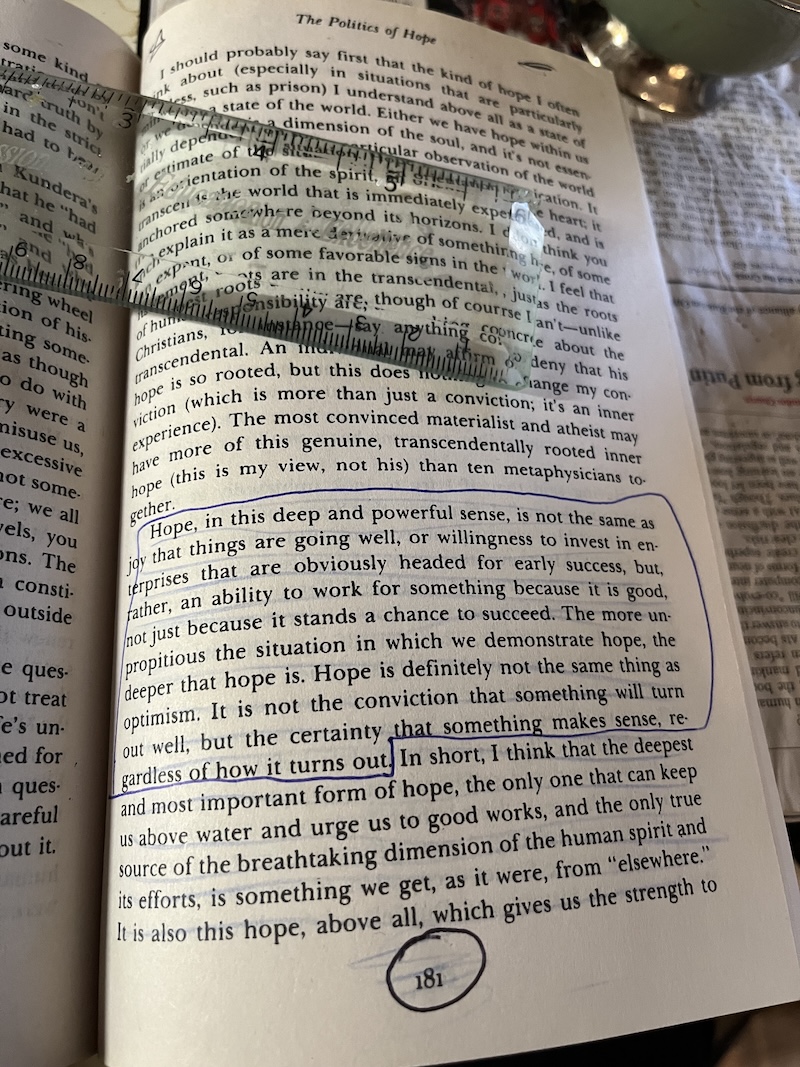
I had breakfast with a mentor a couple of weeks ago. I hadn’t seen him in well over a year. So calling him a mentor isn’t right, but I want to express that he is older and has lived a life I admire and wish to learn from. We talked about everything going on in this country right now. He has had a long career practicing law for the benefit of the poor, underprivileged, and alien of this land. He’s stood for compassion, cooperation, and love for the other, fueled by a faith that prioritizes orthopraxy before orthodoxy.
Towards the end of our meeting, he mentioned the book he was currently reading. It was Disturbing the Peace by Václav Havel. He later sent me two photos to remind me of the title.
…the kind of hope I often think about (especially in situations that are particularly hopeless, such as prison) I understand above all as a state of mind, not a state of the world. Either we have hope within us or we don’t; it is a dimension of the soul; it’s not essentially dependent on some particular observation of the world or estimate of the situation. Hope is not prognostication. It is an orientation of the spirit, an orientation of the heart; it transcends the world that is immediately experienced, and is anchored somewhere beyond its horizons.
Hope, in this deep and powerful sense, is not the same as joy that things are going well, or willingness to invest in enterprises that are obviously headed for early success, but, rather, an ability to work for something because it is good, not just because it stands a chance to succeed. The more unpropitious the situation in which we demonstrate hope, the deeper that hope is. Hope is definitely not the same thing as optimism. It is not the conviction that something will turn out well, but the certainty that something makes sense, regardless of how it turns out. In short, I think that the deepest and most important form of hope, the only one that can keep us above water and urge us to good works, and the only true source of the breathtaking dimension of the human spirit and its efforts, is something we get, as it were, from “elsewhere.” It is also this hope, above all, which gives us the strength to live and continually to try new things, even in conditions that seem as hopeless as ours do, here and now.
The Marginalian: The Great Czech Playwright Turned Dissident Turned President Václav Havel on Hope
Isn’t it the moment of most profound doubt that gives birth to new certainties? Perhaps hopelessness is the very soil that nourishes human hope; perhaps one could never find sense in life without first experiencing absurdity.
…I’m certain this quote didn’t cross my desk via this wikiquote link, but I can’t find my original source now. It pairs so nicely with the one above.
Saved for later: The Power of the Powerless
In visiting the amazing-since-forever Marginalian blog, I was presented a popup modal, not unlike the millions (maybe billions) of email signup beg modals we experience every day on the web. But this one offered a poem. A poem? Yes, please. It was this:
The Marginalian: But We Had Music
Following links to other The Universe in Verse posts was a delightful, inspiring, and dare I say hopeful rabbit-hole after another long day.